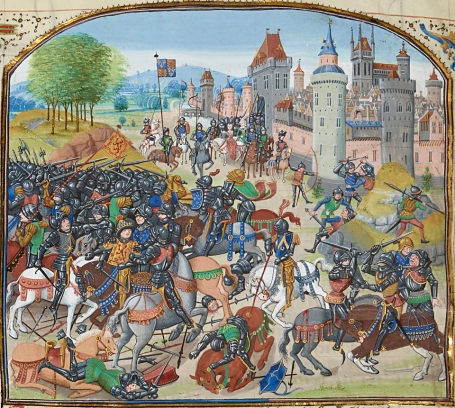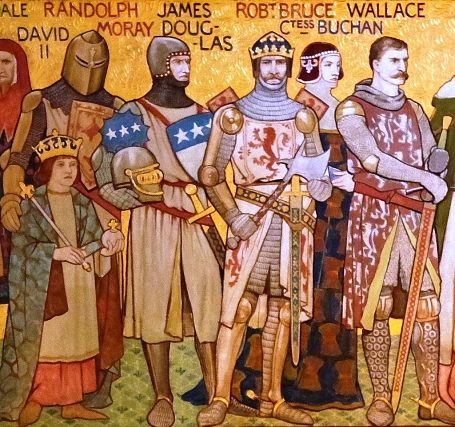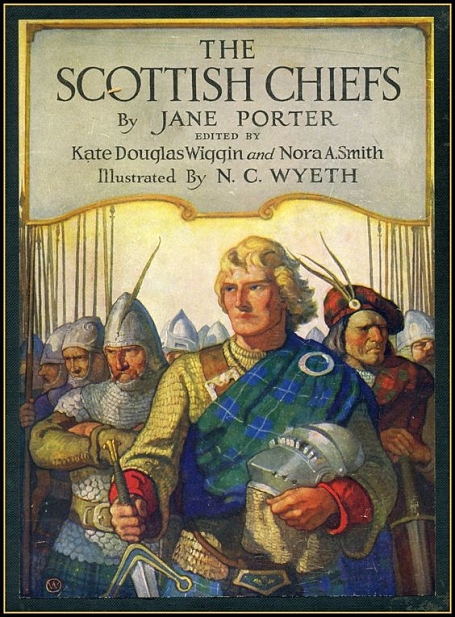The Life and Heroick Actions of the Renoun'd Sir William Wallace,
General and Governour of Scotland
by William Hamilton of Gilbertfield
Book XI, Chapter III
How Edward King of England came into Scotland, and made whole Conquest thereof.
Vallange the Knight, to Scotland did repair,
The false Montieth, Sir John, did meet him there.
Sir John the Lennox greatly did desire,
To whom Sir Aymer promis'd it in Hire,
To hold in Fee, and other Lands moe
Of Edward, if to London he would go.
Thus they accorded and to London went,
Which pleas'd King Edward to his Hearts content.
Montieth on sight was bound to that fierce King,
In Scotland to assist him in each Thing.
Then both return'd no longer there did wait,
Pox on their nasty Snouts for Villains great!
For the Montieth told Edward ev'ry Thing,
And that the Scots design'd Bruce for King.
Within the Space, I think, of Forty Days,
King Edward did a swinging Army raise.
To Scotland march'd and no Resistance fand,
Were none that Time that could his Force withstand.
All the Scots Forts and Castles, in a Word,
He got without a single Stroak of Sword.
So Fierce, so Cruel, was this King and bold,
The noble Lords that would not of him hold,
To English Prisons he did quickly send,
Where good Sir William Douglas made his End.
The Earl Thomas, Lord of Murray then,
And the Lord Frazer, Two brave Noblemen,
With Hugh the Hay and many Nobles moe,
With Villain Vallange did for England go.
Seaton and Lauder in the Bass did dwell,
And Lundie, that could act his Part full well.
The Earl Malcolm, and the Campbel brave,
Bute as their Place of Refuge taken have.
Ramsay and Ruthven both fled to the North,
Unto their Cousin, the Lord of Fillorth.
He past with them thro' Murray Land outright,
And there they found a Gen'rous worthy Knight,
Clement to Name, who ever still had been
Against the South'ron valiant, stout and keen.
He led those Lords to Ross with greatest care,
And at Stockford a Strength he builded there.
Good Adam Wallace, Craigy, Boyd, those Three,
Fled all to Arran one Night by the Sea.
Into Dunbar Corspatrick dwelt at will,
But pay'd his Fewty to King Edward still.
Lord Abernethy, Soulis and Cummine als,
And John of Lorn, that long Time had been false,
The Lord of Brechin, many other moe,
To Edward's Peace for Gifts did frankly go.
Then do the Lords and others send Express
From Bute to Wallace with a long Address:
"Our Hope our Health, our Governour most great,
Our Chiftain true, and Help in every Strait.
Our Lord and Love, thy Absence does us grieve,
For God's Sake come, and once more us relieve,
And take the Crown, for we protest and swear,
We'll not consent that Edward shall it wear."
This Writ he got, which vex'd him in his Mind,
Tho' then an Answer he did not incline.
By this King Edward in Lord York's Hand,
From Tay to Dee had lodg'd the sole Command.
For's Father's sake and good Sire's, this was giv'n,
Who both were kill'd by Wallace, at Kincleven.
Lord Bewmont, to command the North was sent,
And then from Perth, Edward to Stirling went.
The Lord of Clifford who had Douglasdale,
Was Rider made of the South Marches haill.
All Galloway the Cummine got in Hand –
For such a Rogue too good and large a Land.
The Bishop of St. Andrews, Lambertoun,
At this Time kept the Douglas of Renown,
To whom the Bishop great Affection bore,
But durst not show't when Suthron were before.
Yet made he Douglas on a Day to go,
With him to Stirling 'cause he lov'd him so.
Where from King Edward (tho' it prov'd in vain,)
He begg'd the Douglas Land to him again.
Who when he knew him Douglass Son to be,
Swore by St. George, "No Land he's get from me.
His Father fought against my Crown alway
For which he in my Prison lies this Day."
No other Answer there the Bishop got,
Because the Douglas was so true a Scot.
He gave the Merse to Soullis that Limmer Lown.
And made him Captain too of Berwick Town,
When Stirling Castle Oliphant resign'd,
He thought, that Writ would surely Edward bind:
But O! such horrid Treatment and absurd
He violate his Faith, and broke his Word:
Sent him to England to a Prison strong,
In Misery where he continu'd long.
When Edward had divided Scotland broad,
Away in Triumph the Usurper rode.
With him was Cummine, that sweet dainty Dear,
Who whisper'd softly in the Bruce's Ear:
"If you'll keep Counsel, I'll unto you show,
What you before perhaps did never know."
"Say on," said Bruce, "what you reveal to me,
I promise for my Part, conceal'd shall be."
Then said Lord Cummine, "Sir this is the Thing,
O'er this Realm you should be righteous King."
The ballad, The Life and Heroick Actions of the Renoun'd Sir William Wallace, General and Governour of Scotland, by William Hamilton of Gilbertfield, 1722, is in the public domain.

The Kingdom of England and the Kingdom of Scotland fought dozens of battles with each other. They fought typically over land, particularly Berwick-Upon-Tweed, and the Anglo-Scottish border frequently changed as a result. Read more at Wikipedia.

The First War of Scottish Independence was the initial chapter of engagements in a series of warring periods between English and Scottish forces lasting from the invasion by England in 1296 ... Read more at Wikipedia.

Digitized version of The Scottish Chiefs, by Jane Porter, a novelization published in 1921 by Charles Scribner's Sons, about William Wallace and the First Scottish War of Independence. Read online at archive.org.